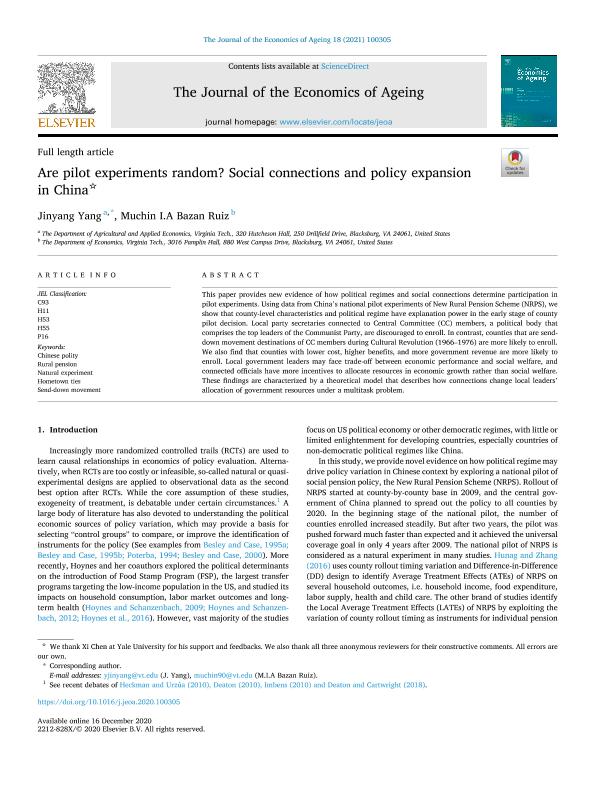Are pilot experiments random? Social connections and policy expansion in China

Contenido multimedia no disponible por derechos de autor o por acceso restringido. Contacte con la institución para más información.
| Tag | 1 | 2 | Valor |
|---|---|---|---|
| LDR | 00000cab a2200000 4500 | ||
| 001 | MAP20210010217 | ||
| 003 | MAP | ||
| 005 | 20210326145718.0 | ||
| 008 | 210326e20210201esp|||p |0|||b|spa d | ||
| 040 | $aMAP$bspa$dMAP | ||
| 084 | $a345 | ||
| 100 | 1 | $0MAPA20210005138$aYang, Jinyang | |
| 245 | 1 | 0 | $aAre pilot experiments random? Social connections and policy expansion in China$cJinyang Yang |
| 520 | $aThis paper provides new evidence of how political regimes and social connections determine participation in pilot experiments. Using data from China's national pilot experiments of New Rural Pension Scheme (NRPS), we show that county-level characteristics and political regime have explanation power in the early stage of county pilot decision. Local party secretaries connected to Central Committee (CC) members, a political body that comprises the top leaders of the Communist Party, are discouraged to enroll. In contrast, counties that are senddown movement destinations of CC members during Cultural Revolution (19661976) are more likely to enroll. We also find that counties with lower cost, higher benefits, and more government revenue are more likely to enroll. Local government leaders may face trade-off between economic performance and social welfare, and connected officials have more incentives to allocate resources in economic growth rather than social welfare. These findings are characterized by a theoretical model that describes how connections change local leaders' allocation of government resources under a multitask problem. | ||
| 650 | 4 | $0MAPA20080552114$aPensiones | |
| 650 | 4 | $0MAPA20080559380$aMedio rural | |
| 650 | 4 | $0MAPA20080573744$aBienestar | |
| 650 | 4 | $0MAPA20080568382$aCompensaciones | |
| 651 | 1 | $0MAPA20080644178$aChina | |
| 773 | 0 | $wMAP20210010194$tThe Journal of the economics of ageing $dOxford : Elsevier ScienceDirect, 2021-$g01/02/2021 Volumen 18 - 2021 , 13 p. |

